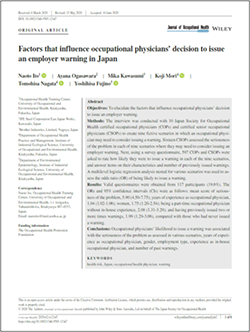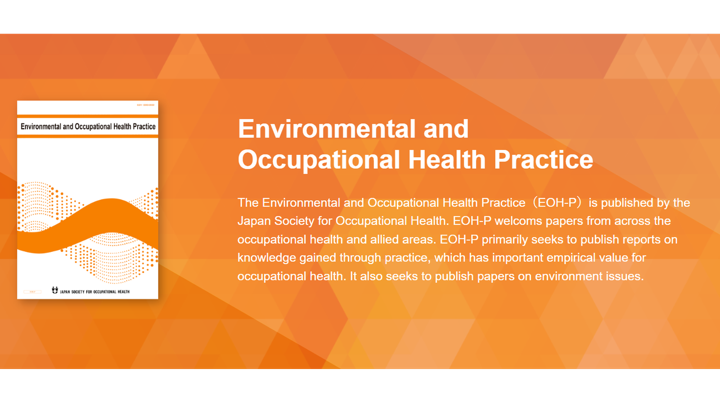#0078 Factors that influence occupational physicians’ decision to issue an employer warning in Japan

To Warn or Not to Warn: What Influences Occupational Physicians to Issue Warnings?
In Japan, business operators employing 50 or more workers are required by law to appoint a certified occupational physician (COP), whose role is to help prevent and treat work-related illnesses and injuries. As a last resort, COPs have the authority to issue written warnings to the employer of an organization if they deem the health of workers is at risk for some reason. Afterwards, the employer has to formally respond to the health committee and take appropriate action.
Despite having access to such a powerful tool, physicians who specialize in occupational health tend to issue much fewer employer warnings than occupational physicians who work part-time besides their main job in hospitals or clinics. In addition, it seems the judgement of senior COPs is markedly different than that of COPs with less experience, which makes it difficult to determine if they are all exercising their authority properly.
In light of these differences, it is important that we build a consensus among occupational physicians for issuing warnings so that this power is used to effectively improve occupational health. Thus, in our study, we sought to identify some of the factors that influence COPs when faced with the decision of issuing an employer warning.
By collaborating with many COPs and senior COPs, we carefully designed nine fictional scenarios in which an occupational physician might opt to issue an employer warning. The severity of these fictional scenarios was rated by senior COPs with over 15 years of experience and then delivered as a questionnaire to a variety of occupational physicians, who responded how likely they would be to issue a warning in those situations.
We statistically analyzed the results obtained from 117 participants and determined factors associated with the likelihood of issuing an employer warning. Aside from the severity of each fictional scenario, which ranged from potentially fatal to completely reversible consequences, the years of experience and type of employment were important factors: in-house COPs and those with more experience were more likely to issue warnings.
We also found gender differences, with men COPs less inclined to issue warnings. Moreover, COPs who had already issued warnings in the past were also more likely to issue warnings in the fictional scenarios considered.
The results of our study will help narrow down the differences between occupational physicians so that their authority is used more consistently and uniformly. In the longer term, this will help ensure the health and safety of workers.

Link to the original journal article:
https://onlinelibrary.wiley.com/doi/10.1002/1348-9585.12147
Title of the paper:
Factors that influence occupational physicians’ decision to issue an employer warning in Japan
Authors:
Naoto Ito, Ayana Ogasawara, Mika Kawasumi, Koji Mori, Tomohisa Nagata, Yoshihisa Fujino




